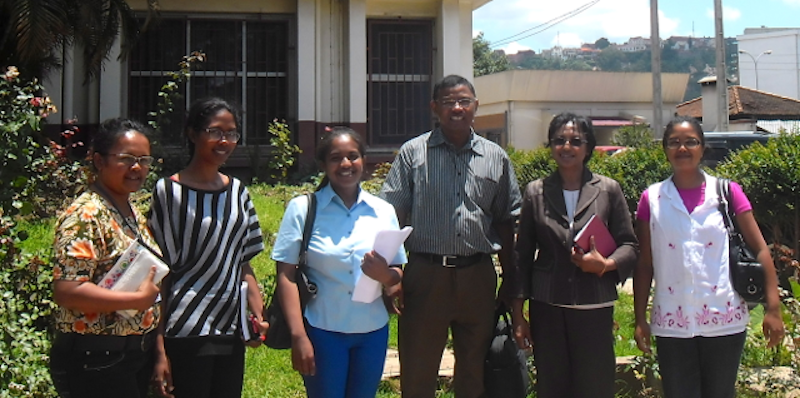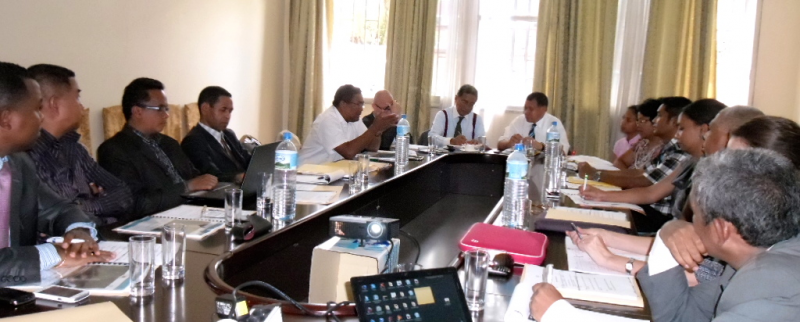
In WAVES countries, governments are committing resources and people to ensure natural capital accounting (NCA) is coordinated across sectors and becomes a part of governments’ routine business for the long-term. Dedicated units are being set up in key ministries or, in some countries, a central unit coordinates NCA work across departments.
The Wealth Accounting and the Evaluation of Ecosystem Services (WAVES) partnership was meant to provide support for an initial four years, and one of the measures of success was that countries then take on implementation. We are nearing the end of four years for the first five countries and this vision is coming true.
In Botswana, Ogopotse Batlokwa Pule is one of the three officers in a unit in the country’s Ministry of Finance and Development Planning (MFDP) working to coordinate natural capital accounting efforts across relevant sectors and has high-level support from Botswana’s President Ian Khama.
“The core duty for officers within the unit is NCA and this makes it easier for data collection, analysis and stakeholder engagement across sectors,” said Pule, who serves as the chief economist.
He said that coordination centered in the MFDP in Botswana streamlines the process for information gleaned from NCA to contribute to national development plans.
In Madagascar, the NCA unit plays both a key role in the development of natural capital accounts, and is part of the strategy to institutionalize and sustain the process beyond WAVES.
“NCA requires coordination among various departments…the natural capital accounting unit is a kind of platform where the exchange of information occurs. It opens the lines of communication, which is very important to accomplish high-quality (work) and long term commitment,” said Rija Ranaivoarison, the WAVES country coordinator in Madagascar.
An Overview of the NCA Units

In Botswana, in addition to the coordinating unit in the Ministry of Finance and Development Planning, a unit within the Department of Water Affairs staffed by five is working to regularly update water accounts, which provides information on the availability, uses, and economic contribution of water. In July 2015, the unit underwent a weeklong training organized by WAVES to learn new techniques to improve data collection and reduce analysis and turnaround time for water accounts.
The NCA coordinating unit within the Macroeconomics Policy Division of the Ministry of Finance and Development Planning (MFDP) is staffed by two economists and an intern and coordinates NCA objectives across relevant sectors.
The NCA units have the power to control their own budgets, plan trainings and surveys, and disseminate results.
In addition to the two units, other departments have dedicated staff assigned to NCA as part of their duties: five officers work on energy accounts, and four on mineral accounts.
Colombia has an environmental accounting unit located in the Department of Statistics (DANE) with a dedicated team of six people. It has been in place for more than 10 years, and makes Colombia one of the few countries in Latin America with such a structured unit to implement NCA. The team has participated in WAVES trainings, including a regional workshop on NCA in Latin America focusing on water accounts, and a workshop on ecosystem accounting that took place in the Philippines. They are working on ecosystems, forest and water accounts.
Costa Rica is working on water and forest accounts, and starting with energy accounts, with support from WAVES. The Central Bank of Costa Rica (BCCR) created a new unit that was approved by the board of directors of the Central Bank in September 2015. It will be staffed by four people and continue the work done so far and advance the compilation of additional accounts in the future, coordinate with other agencies, and work to strengthen related policy and institutional arrangements.
The Governments of Costa Rica and Colombia have both passed formal agreements requiring that accounts be developed on a regular basis.
The five-person Natural Capital Accounting Unit (NCAU) in Madagascar is based in the Ministry of Economy and Industry and coordinates and implements the work program and output of WAVES Madagascar. Madagascar is working on accounts for forests, mining, water, and macroeconomic indicators.

Each account is developed by the “champion” from the relevant ministry. The NCAU coordinates and oversees the work of all champions, and ensures cross-sector coordination and cooperation. The unit is also directly responsible for constructing macro-economic indicators, currently working on total wealth and adjusted net savings calculations with the technical assistance of the National Statistical Institute of Madagascar.
WAVES Madagascar is working to strengthen the technical capacity of the members through trainings so the unit will be fully responsible for the coordination and oversight of NCA in Madagascar post-WAVES.
“The NCAU is critical to avoid duplication of effort, lack of synergy and missed opportunities,” said Ranaivoarison. “NCA should become a regular job particularly for the Ministry of Economy. This goal could not be achieved without setting up a unit.”
The Philippines recently released the initial results of the Laguna Lake Basin and the Southern Palawan experimental ecosystem accounts, which have been widely circulated and welcomed by the government. The country is interested in scaling up NCA and their efforts to institutionalize it in government include setting up two units to support the work.
A unit with three full-time staff will be based in the Philippine Council for Sustainable Development (PCSD), and a second unit in the Philippine Statistics Authority (PSA), called the Environment and Natural Resource Accounts Division (ENRAD), will be staffed with nine statisticians to ensure regular data generation and compilation of both environmental accounts and disaster and climate-change related statistics. The initial plan is to produce physical and monetary asset accounts for minerals, land and soil, forests, fisheries, water, energy and biological resources for asset accounts or stock accounting.
The unit will also provide technical assistance to other offices within PSA and the government, as well as the private sector; develop and maintain an indicator system for Sustainable Development Goals (SDGs); and work to standardize data collected on a local level in accordance with internationally agreed frameworks.
“Institutionalizing the compilation of environmental accounts within PSA will ensure consistency of NCA with the national accounts of the country. More importantly, the accounts should be able to demonstrate economic and environmental realities,” said Rey Fulleros, Team Leader of Phil-WAVES.
